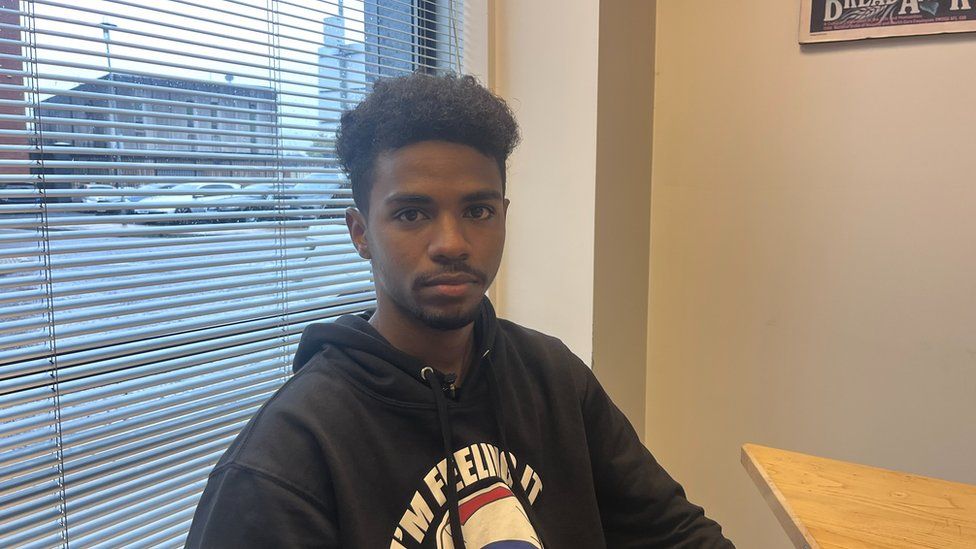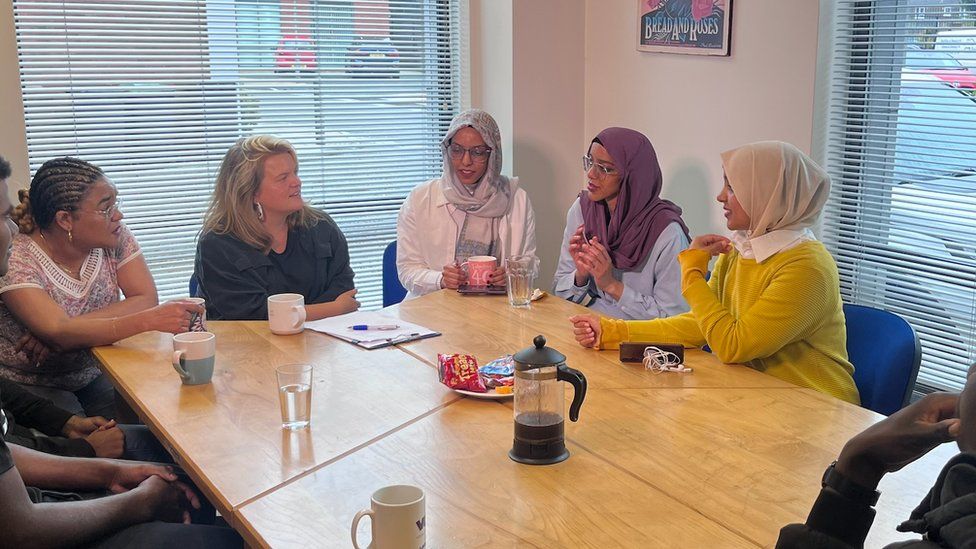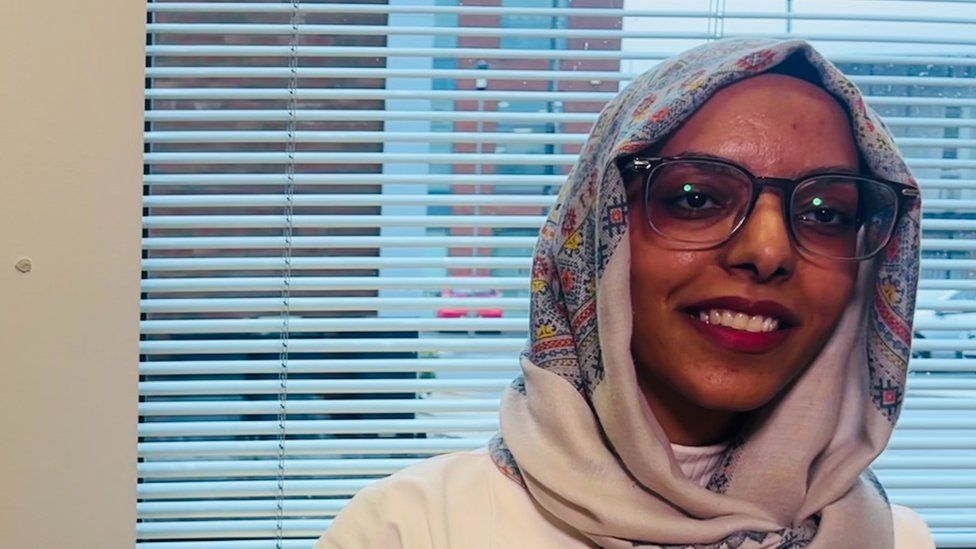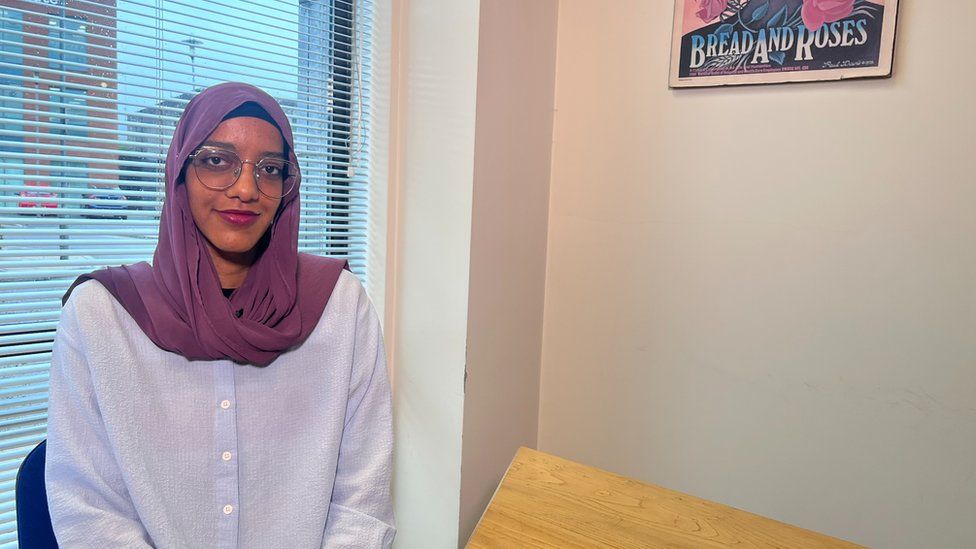Hopeless and frozen - that's how some young asylum seekers in Northern Ireland feel with limited access to education and specialised support.
This year, 10 out of 15 children who arrived here during Year 12 secured school places.
The Department of Education said there was no statutory duty to educate beyond 16 years of age.
However, other parts of the UK have education programmes for asylum seekers when compulsory education ends.

Campaigners say Northern Ireland needs to follow suit
This call was echoed by a group of young asylum seekers, all under the age of 20, who spoke to BBC News NI.
One of them, Osama Mohammad, said he had big dreams but the lack of access to education has been disappointing.
"I came here hopeful, but everyone will tell you that there is no chance," he said.
Another, the eldest of three sisters who arrived in Northern Ireland from Sudan, said she was due to start a degree in her home country and was hoping to go to school here.
"I was waiting a whole year just to get language classes and I was struggling," said Afnan-Alislam Elmahina.
Unlike England, Scotland and Wales, Northern Ireland has no refugee integration strategy.
Deirdre McAliskey, who works with Children's Law Centre and South Tyrone Empowerment Programme, told BBC News NI it was the state which was responsible for children's rights.
"We need to see, and could see, action from the UK government in terms of investment and arguably should see changes to policies that would bring us in to line with our international obligations under human rights but also our local obligations in terms of equality legislation," she said.
Older teenagers who arrive here as refugees or asylum seekers will often get little or no education or help with language learning.
ESOL (English for speakers of other languages) classes are available, but there are often long waiting lists - some of the young people who spoke to BBC News NI waited more than a year.
If young people do manage to find a school place, attend classes and complete exams, the cost of university can be prohibitive as asylum seekers here pay the same as international/overseas students, which is much more than the cost for students from the UK.
In Scotland, however, free tuition fees have been extended to migrant students.
A recent report from Queen's University on the experiences of education among minority ethnic groups in Northern Ireland said that "navigating the complex NI education system is a challenge for migrant parents, especially application processes for those with lower levels of literacy in English".
The report added: "There were also reports of some schools declining to admit newcomers despite available places."
BBC News NI met a group of young asylum seekers and refugees in the office of an organisation that works in this area - they were unanimously despondent about educational options open to them, but they had not lost heart.
They are keen to get qualifications so they can, in their own words, repay this new country they call home.
Among the group are three sisters - Afnan, Fajeer and Nafisa-Alislam Elmahina - who all came to Northern Ireland from Sudan, when fighting broke out between rival military factions in April.
Now, all three wish to push on as much as possible with their education, but are finding it hard.

"When I first arrived I was put on a waiting list for English classes and we realised there were many people waiting - they were disappointed and hopeless," said Fajeer.
For Nafisa, arriving here led to hope that "you are going to maybe change your life or go to your dreams but, you feel like there is something frozen".
"It's very disappointing. It's very slow to go to college. I feel like I am wasting my years," she added.

Afnan, the eldest sister, said she was about to start a degree when she left home. She hopes to be a broadcaster.
"I was about to go to university. I struggled with that when I got here. I hoped to go to university or school here but I was waiting for a whole year just to get language classes and I was struggling," she said.
"Being stuck at home and trying to find something to do - it's very hard, I was always trying to volunteer or do anything.
"I thought I would continue my education and when I got here I was very surprised.
"We also want to support this country, Belfast is a part of me now."

Meanwhile, Osama Mohammad said he wanted to pursue his education and English lessons.
"So far it has been so disappointing, arriving here at my age, I have had no chance," he said.
"The hopes and dreams of refugees and asylum seekers are big, people come here to get education, to get jobs and be part of the community."
Mears - a Home Office contractor - told BBC News NI that there are currently at least 1,300 people living in contingency accommodation across Northern Ireland and about 3,000 asylum seekers living here overall.
Refugee and asylum-seeking children and young people of compulsory school age have the same legal entitlement to full-time education as other UK pupils.
The Department of Education told BBC News NI that it worked with the Education Authority's Intercultural Education Service (IES) to secure school places for all children arriving in Northern Ireland seeking asylum or as refugees.
It added that the department was aware that "those arriving in the 15+ age group may only attend compulsory education for a short period of time and until the end of Year 12".
"The department is working in conjunction with DfE (the Department for Education) to explore potential pathways into further education for such children," a spokesperson said.
© OfficialAffairs